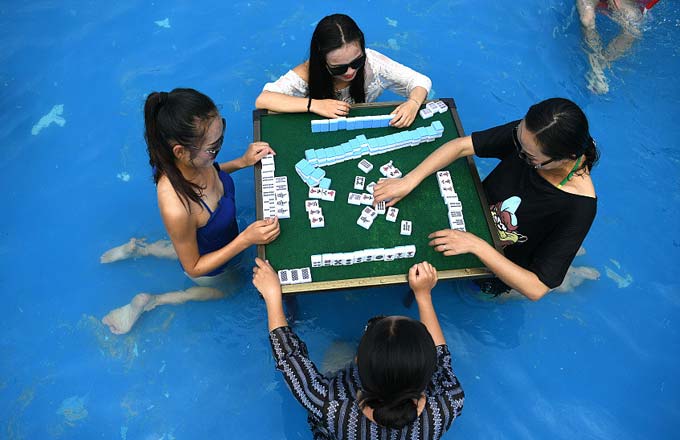Chinese science teleported into the lead in quantum race
China has become the first country to send quantum keys-highly complex encryptions-from a satellite to a base on Earth, and to teleport light particles the other way.
The accomplishments are two major breakthroughs in the effort to create an unhackable global communications network.
The two experiments mark the completion of the the second and third of the three main goals of Micius, the world's first quantum communications satellite, which China launched last year.
The first goal, to send entangled light particles further than ever before, was achieved in June. Entanglement is a phenomenon in which two or more particles can affect each other simultaneously regardless of distance. Entangled particles cannot be described independently of each other.
Bai Chunli, president of the Chinese Academy of Sciences, said China is now the world leader in quantum communication technologies and is working with scientists from Austria, Germany and Italy. He said Micius will continue to perform experiments until its expected service life expires next year.
"The trio of quantum experiments will be central to any global space-based quantum internet," Karl Ziemelis, chief physical science editor at Nature magazine, said in a video interview. The magazine published two articles about China's breakthroughs on Thursday.
"They are testaments to China's investment and significant effort in physical sciences … and pushed research in practical quantum communication technology to such astronomical heights."
All private data, from bank accounts to social media pictures, are protected by "keys", which are extremely complex mathematical codes transmitted between users and companies. However, these codes can be exploited if a hacker "eavesdrops" on these keys during transmission.
Quantum keys use quantum physics rather than math to encrypt data, making them impossible to hack by conventional computers. They also have the ability to alert authorities when someone tries to eavesdrop, said Pan Jianwei, an academician with the Chinese Academy of Sciences and the chief physicist behind Micius.
"This will have major applications in government, military, finance, energy and other fields where security is paramount," he added.
However, distributing quantum keys is difficult because sending them over long distances via fiber optics or during daytime results in massive signal loss or disturbance.
In the latest quantum key experiment, Micius beamed photons-individual particles of light-and created an optical link with the observatory station in Xinglong, Hebei province. When the link was at 1,200 kilometers, scientists discovered that quantum key distribution efficiency between the two improved 100 quintillion times (1 followed by 20 zeros) compared with fiber optics of the same length.
Micius produced and transmitted about 300,000 bits of quantum keys during the experiment. One practical use for these keys is to create advanced encryptions that are impossible for computers to hack with "brute force", a method in which a computer guesses all possible combinations of a pass code.
"Combine all the computing power of the world, which is around two to the power of 80 to 100, it will still take years for it to guess the correct combination," Pan said.
The second experiment is about one of the biggest mysteries of quantum mechanics known as quantum teleportation, Ziemelis said. In the experiment, Chinese scientists "spookily" transferred a photon on Earth to Micius in space, without needing the object itself to move.
"Its effect is like the Star Trek teleporter," said Pan. It works by deconstructing a photon on Earth, then sending its extracted quantum information to Micius's receivers via entangled link. Then an entangled photon in space downloads the information and takes on the complete identity of the original.
This experiment would have great theoretical research value in quantum science, as well as building a large-scale quantum internet and computation networks. But scientists are still centuries away from building a teleporter capable of transferring something as biologically complex as humans, Pan said.
China also plans to build the world's first global quantum communication network by 2030. It will consist of three high-orbit and dozens of lower-orbit quantum satellites connecting dozens of ground-based stations and networks.
"But the final number of satellites depends on its usage and market needs," said Pan, adding that there are other major hurdles to overcome, such as distributing quantum keys across continents during daytime. The latter feat was first achieved by China in July when Micius beamed one over 53 kilometers during the day.
The United States and Japan also have plans for quantum communication. Japan launched a microsatellite named SOCRATES in 2014, and it conducted its own quantum channel test in July.
However, Micius is a much larger, versatile satellite capable of different experiments, and has had more success. "China will lead the quantum space race for the next five years," said Pan. "But the world is also catching up fast."




























